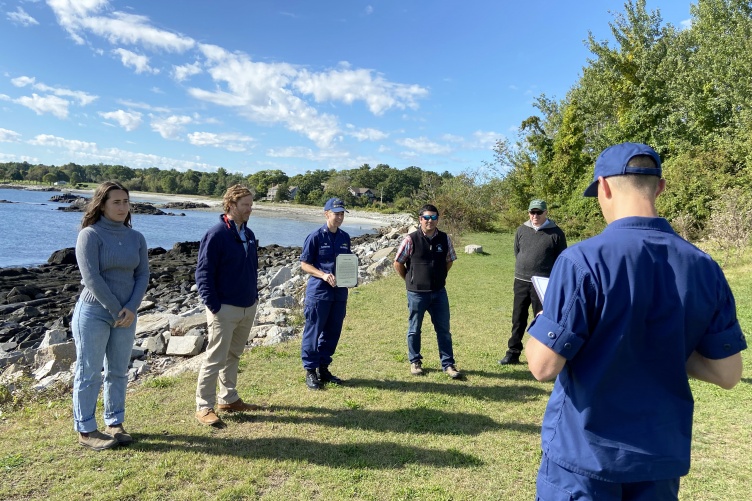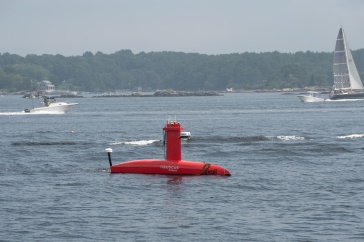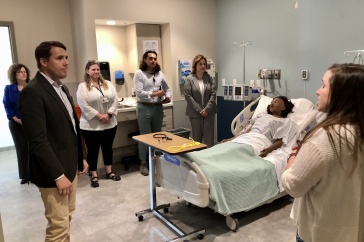
Shoals Marine Laboratory staff members Mackenzie Meier, Gregg Moore, Mike Rosen and Roger Trudeau flank United States Coast Guard Capt. Amy Florentino as LCDR Ryan Koroknay reads an address to the Shoals staff during a ceremony recognizing them for making an ocean rescue this summer.
Rain was threatening but still holding off on a gray July morning when staff from the Shoals Marine Laboratory (SML) boarded a vessel for a routine trip to town that quickly turned in to anything but.
About 10 minutes after departing Appledore Island – where the Shoals Marine Laboratory is jointly run by UNH and Cornell University – Shoals boat captain Roger Trudeau noticed a propane tank and milk crate floating among other debris in the water, and given the odd discovery decided to throttle down and have the staff do a man overboard drill to clean up the mess.
It wouldn’t be a drill for long.
While surveying the scene Trudeau discovered a person floating in the water not far from the debris. He maneuvered the vessel close to the victim, and the crew worked together to pull the person aboard. SML staff jumped into action removing wet clothes and keeping the person warm while Trudeau radioed to the United States Coast Guard’s nearby Portsmouth Harbor station.
The Coast Guard had an ambulance waiting when the SML crew arrived a little more than 20 minutes later, and the patient – who was hypothermic after an estimated two hours or so in the water – was taken away to receive medical attention. That person has since made a full recovery.
On Sept. 29, the Coast Guard held a small ceremony at the Portsmouth Harbor station to recognize the SML staff for their response to the situation. Members of the SML staff aboard the vessel were Trudeau; Mike Rosen, SML's director of operations; Mackenzie Meier, SML laboratory coordinator; Collin Love, SML communications coordinator; and Gregg Moore, SML academic coordinator and associate professor of biological sciences in the College of LIfe Sciences and Agriculture.
“We search to rescue, and oftentimes when you are in these cold-water environments and there’s an accident, it can have a much more tragic ending,” United States Coast Guard Capt. Amy Florentino, commander of Sector Northern New England, said during the presentation. “I really commend you for stopping, taking the initiative to look around and doing all the right things – without a doubt, based on the information we have, you saved this person’s life.”
The SML crew wasn’t certain there was a life to save when they first approached the scene. The person had been floating for several hours after the boat they’d been in had sunk – the debris that Trudeau first spotted was from his sunken vessel – and though conscious, wasn’t responsive until Rosen verbally made contact.
Had either party’s path been even slightly different that morning, the outcome could have been very different.
“If we had left a half-hour later, his drift and our course probably would have been different enough that we would have never seen him,” Trudeau said.
Thankfully, the members of the SML team had a wealth of training and preparation to lean on that proved invaluable. Rosen oversees a staff that routinely practices rescue situations on the water, as they often encounter floating debris – most commonly items like balloons or trash bags – and use the opportunities to keep the water clean as a chance to practice how they’d respond in precisely the situation they found themselves in.
“We train for man overboard regularly, and we just did what we had trained for,” Rosen says. “I think we were fortunate to be in the right place at the right time.”
“I appreciate that those drills serve both to clean up the ocean and as very important safety training,” Jennifer Seavey, John M. Kingsbury Executive Director of the Shoals lab, says. “You don’t have to be in this extreme circumstance to utilize all that training, but you appreciate it even more and realize it can really pay off in ways you don’t typically think about.”
The connection between the SML staff and the Coast Guard also proved vital, as the two groups worked seamlessly together to ensure the safety of everyone involved.
“We’re really lucky to have the Coast Guard right here. When we came in, they had no less than eight people on the dock to greet us and catch lines and transfer our patient to the ambulance,” Rosen says. “I know if we had an emergency at sea, they would be there to help us. It’s an amazing resource we have right here.”
That communal approach to keeping the ocean as safe and clean as possible is something the entire SML team prides itself on. There’s a “code” among those who regularly spend time on the water, Seavey said, and the members of the SML staff are always focused on being aware of that responsibility.
Though the members of the SML team aren’t charged with patrolling the waters to enhance safety as their primary focus, it’s something they willingly accept as part of their commitment to the local ocean ecosystem.
“I think it’s really wonderful that the Coast Guard recognized this, because it reinforces community,” Seavey says. “I appreciate that they are recognizing their maritime community as part of their mission, and we are indeed enhancing safety between the mainland and Shoals and anyplace else we are on the water. We’re protecting more than just the Shoals people, and this was a great lesson to me to remember how important and valuable that is.”
-
Written By:
Keith Testa | UNH Marketing | keith.testa@unh.edu



















































